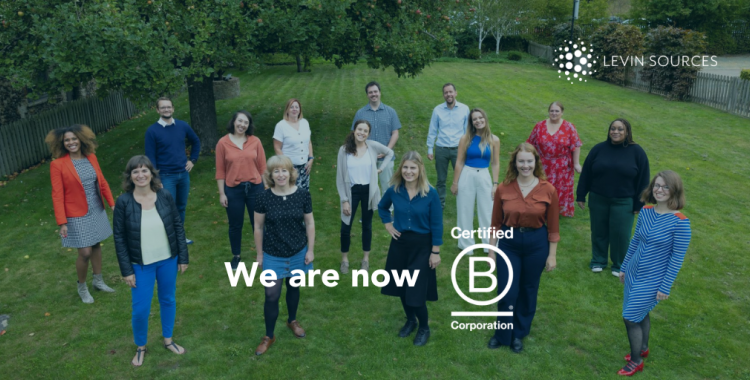Our CEO and Founder Estelle Levin-Nally reflects on the journey to being a certified B Corp.
This May, we are celebrating 13 years (lucky 13!) of Levin Sources by announcing our most recent achievement: we are now a Certified B(enefit for all) Corporation™ (B Corp™)! This is a logical step on the journey I started when I launched a “mission-based consultancy” in 2010 to drive sustainable futures in the minerals and metals sector.
Being a certified B Corp is about accountability, transparency, and recognition. As our partner and client, it provides you with the certainty that we put impact at the heart of our business model, and that we meet a series of high standards around environment, social and governance – or as the B Impact Assessment™ categorises them, the five Governance, Workers, Community, Environment and Customers impact area pillars.
I am proud that we ranked highest in the Workers category. It’s a bit of a cliché for any company to say that their staff is their strongest asset, but our score shows that we really mean it. B Corp measures practices we have been doing since our launch, including facilitating part-time, remote and flexible work.
What is B Corp?
As a B Corp, we join a group of for-profit companies that are legally required to consider the impact of our decisions on society and the environment and generate profits for our shareholders. This means that we prioritise social and environmental goals alongside our financial goals.
B Corps are a growing movement of companies committed to using business as a force for good. They provide consumers with a way to support companies prioritising social and environmental responsibility.
Our experience of B Corp certification
Although our mission of driving the transition to just and sustainable minerals value chains has always been at the heart of our work, I first heard about B Corp certification while taking a course at the University of Cambridge’s Judge Business School in 2017.
This kicked off our formalisation into a social enterprise, which began with updating our articles of association to integrate our mission into our company objects, commit at least 2% of staff time to public interest work and include a ‘social lock’ whereby a shareholder vote of >75% is required to alter our objects. A special thanks to my mentor and our first Board Chair, Karen Anderson, for all her help on this journey!
Having formed our first board of directors in 2019, by early 2020 we were ready to dedicate the staff and financial resources required to complete the B Corp Assessment that summer. However, we all know how the year 2020 went! Given the uncertainty of the pandemic, we focused on protecting our workforce and serving our clients and cut all discretionary spending. By the time lockdowns eased, the wait for certification had become very long!
As we often help private sector clients prepare for audits, it was interesting for us to go through a similar process on our own operations and business relationships. We drew information from multiple aspects of our business and had to rethink the way we organise and report information to match the assessment requirements.
I’m going to be upfront, because it’s important information especially if, like us, you are an SME: certification was time-consuming and required committed resources. In addition, we discovered that some of the assessment is less geared towards service providers, being oriented rather toward manufacturers or retailers of goods. For consultancies, especially one without centralised offices, some questions on topics like the environment were less relevant to us, because we cannot control our office service provider’s electricity source, land management, water efficiency, and so on, though we’ve done our best to influence their ESG decisions where possible.
Another challenge was the fact that we work in conflict-affected areas. This required us to make disclosures as to the nature of that work, the degree of our exposure and how we manage our risks and created a risk that our application would not be accepted.
What’s next?
I have come to think of B Corp certification as a verb, something that requires continuous improvement. The detailed assessment helped us identify areas where we can improve. We are going to use B Corp’s Sustainable Development Goal dashboard to develop our impact measurement and reporting framework.
Our goal is to improve our positive impact and therefore score across all five areas measured by B Corp ahead of the re-certification audit in three years’ time. In the spirit of transparency championed by the certification, we will report back here.



